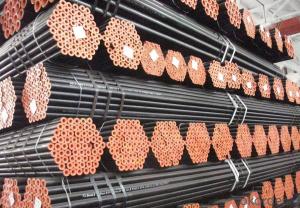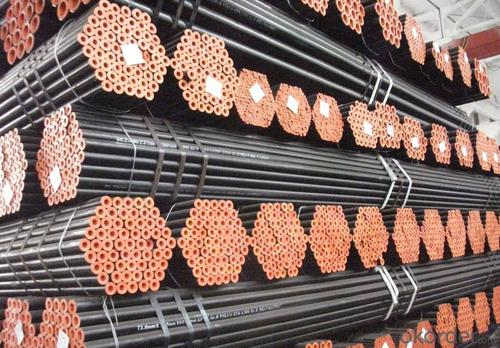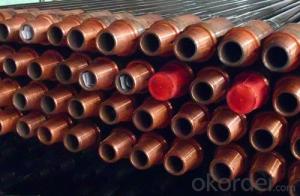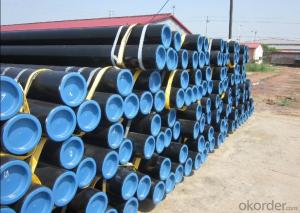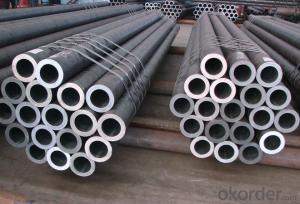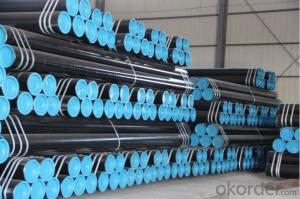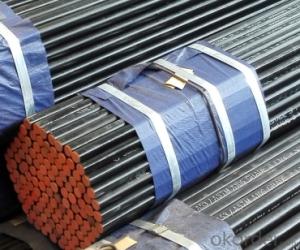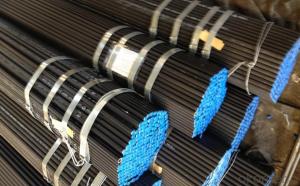Seamless Pipe with High Quality API5L, ASTM A106/53
- Loading Port:
- Tianjin
- Payment Terms:
- TT or LC
- Min Order Qty:
- 100 m.t.
- Supply Capability:
- 1000 m.t./month
OKorder Service Pledge
OKorder Financial Service
You Might Also Like
1、Structure of Seamless Pipe ASTM A106/53:
Seamless pipe is produced by drawing a solid billet over a piercing rod to create the hollow shell.
2、Main Features of the Seamless Pipe ASTM A106/53:
• High manufacturing accuracy
• High strength
• Tiny inertia resistance
• Strong heat dissipation ability
• Good visual effect
• Good price
3、Seamless Pipe ASTM A106/53 Specification:
Standard | GB, DIN, ASTM ASTM A106-2006, ASTM A53-2007 |
Grade | 10#-45#, 16Mn 10#, 20#, 45#, 16Mn |
Thickness | 8 - 33 mm |
Section Shape | Round |
Outer Diameter | 133 - 219 mm |
Place of Origin | Shandong, China (Mainland) |
Secondary Or Not | Non-secondary |
Application | Hydraulic Pipe |
Technique | Cold Drawn |
Certification | API |
Surface Treatment | factory state or painted black |
Special Pipe | API Pipe |
Alloy Or Not | Non-alloy |
Length | 5-12M |
Outer Diameter | 21.3-610mm |
Grade | 20#, 45#, Q345, API J55, API K55, API L80, API N80, API P110, A53B |
Standard | ASME, ASTM |
4、Packaging & Delivery
Packaging Details: | seaworthy package,bundles wrapped with strong steel strip |
Delivery Details: | 15-30days after received 30%TT |
5、FAQ of Seamless Pipe ASTM A106/53:
①How is the quality of your products?
Our products are manufactured strictly according to national and internaional standard, and we take a test
on every pipe before delivered out.
②How about price?
Yes, we are factory and be able to give you lowest price below market one, and we have a policy that “ for saving time and absolutely honest business attitude, we quote as lowest as possible for any customer, and discount can be given according to quantity.
③Why should you chose us?
Chose happens because of quality, then price, We can give you both.Additionally, we can also offer professional products inquiry, products knowledge train(for agents), smooth goods delivery, exellent customer solution proposals.
SGS test is available, customer inspection before shipping is welcome, third party inspection is no problem.
If you have any question, pls feel free to contact us !
6、Seamless Pipe ASTM A106/53 Images:
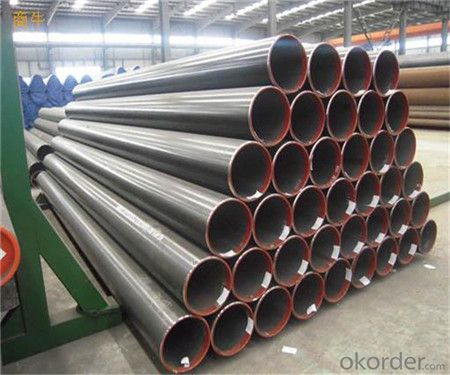
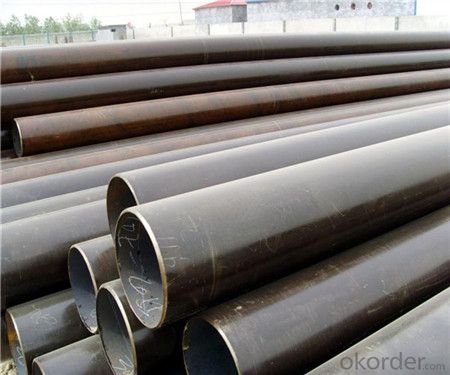
- Q: How do you determine the required support spacing for steel pipes?
- The required support spacing for steel pipes is determined by considering various factors such as the pipe diameter, material strength, operating conditions, and local building codes and regulations. One of the primary considerations is the pipe's diameter. Larger diameter pipes generally require more frequent support than smaller diameter pipes to prevent excessive deflection and sagging. The material strength of the pipe is also important, as stronger pipes can span longer distances without additional support. The operating conditions of the pipe, such as the fluid being transported and the temperature, can also impact the required support spacing. For example, pipes carrying heavy or corrosive fluids may need more frequent support to prevent excessive stress and potential failure. Local building codes and regulations often provide specific guidelines for the minimum support spacing for steel pipes. These codes may take into account factors such as the pipe diameter, material strength, and operating conditions, as well as safety considerations and structural requirements. In general, it is essential to consult relevant codes, standards, and engineering guidelines to determine the required support spacing for steel pipes accurately. Additionally, working with qualified engineers and professionals experienced in pipe design and installation can ensure that the support spacing meets all necessary requirements and ensures the safe and efficient operation of the piping system.
- Q: Can steel pipes be used for underground water lines?
- Yes, steel pipes can be used for underground water lines. Steel pipes are commonly used for water distribution systems as they are durable, strong, and resistant to corrosion. However, it is important to consider the specific conditions and requirements of the project, as other types of pipes such as PVC or HDPE may be more suitable in certain situations. Proper coating and insulation should also be applied to steel pipes to protect against underground environmental factors.
- Q: How do steel pipes handle water erosion?
- Steel pipes are highly resistant to water erosion due to their inherent strength and durability. The smooth surface of steel pipes minimizes friction and turbulence, reducing the likelihood of erosion. Additionally, steel pipes can be coated with protective layers, such as galvanization or epoxy, that further enhance their resistance to water erosion.
- Q: How long do steel pipes typically last?
- Steel pipes typically have a lifespan of 50 to 100 years, depending on various factors such as the quality of the steel, installation conditions, maintenance, and exposure to corrosive elements.
- Q: What is the maximum length of steel pipes available in the market?
- The maximum length of steel pipes available in the market can vary depending on various factors such as the type of steel, manufacturing capabilities, transportation limitations, and customer requirements. However, in general, steel pipes can be manufactured in lengths of up to 12 meters (40 feet) or even longer. It is important to note that longer lengths may be more challenging to handle and transport, and may require specialized equipment or techniques. Ultimately, the maximum length of steel pipes available in the market will be determined by the specific needs and capabilities of the industry and customers.
- Q: Can steel pipes be used for oil and gas transportation?
- Yes, steel pipes are commonly used for oil and gas transportation due to their strength, durability, and resistance to corrosion.
- Q: Can steel pipes be used for irrigation systems?
- Yes, steel pipes can be used for irrigation systems. They are commonly used due to their durability, strength, and resistance to corrosion. Steel pipes can handle high water pressure and are suitable for both above-ground and underground installations in irrigation systems.
- Q: What are the common standards and specifications for steel pipes?
- The common standards and specifications for steel pipes include ASTM A53, ASTM A106, API 5L, and ISO 3183. These standards outline the requirements for the manufacturing, dimensions, and mechanical properties of steel pipes used in various industries such as oil and gas, construction, and transportation. Additionally, specific applications may have their own standards and specifications that need to be met for quality and safety purposes.
- Q: Can steel pipes be used for underground water supply networks?
- Steel pipes are a viable option for underground water supply networks; they possess qualities such as durability, strength, and corrosion resistance. These pipes are commonly employed due to their ability to endure high pressure and bear the weight of the soil and other external forces. Furthermore, steel pipes come in a range of sizes and can be easily welded, making them suitable for diverse water supply system needs. Nevertheless, it is crucial to consider factors like soil quality, the presence of corrosive substances or chemicals, and the necessity of routine maintenance to guarantee the long-lasting effectiveness of steel pipes in underground water supply networks.
- Q: The plastic pipe and steel pipe difference
- The steel plastic pipe is a general term, which includes plastic pipe, plastic lined pipe. Plastic pipe external coating, zinc coated and so on in Shanghai, Fujian, Portland, professional in this area
Send your message to us
Seamless Pipe with High Quality API5L, ASTM A106/53
- Loading Port:
- Tianjin
- Payment Terms:
- TT or LC
- Min Order Qty:
- 100 m.t.
- Supply Capability:
- 1000 m.t./month
OKorder Service Pledge
OKorder Financial Service
Similar products
Hot products
Hot Searches
Related keywords
